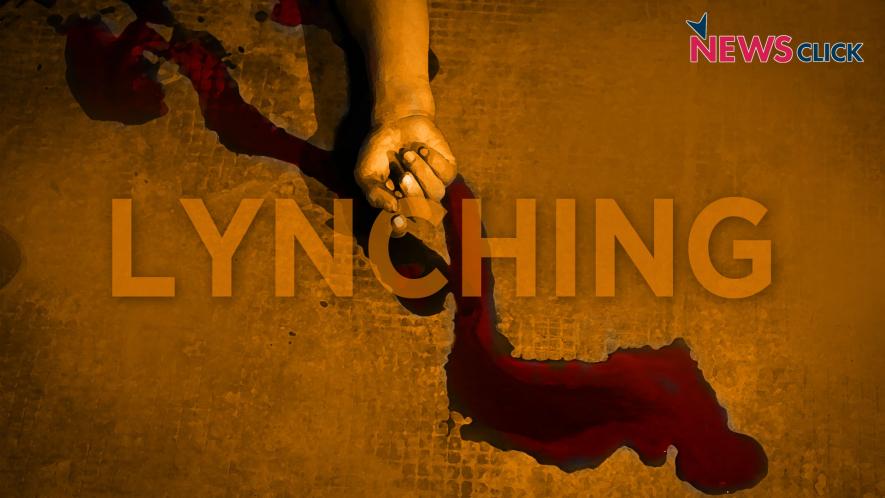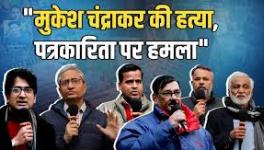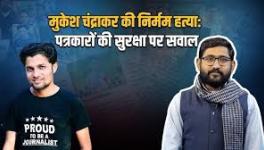Lynching Finds Its Way Into Fictional Narratives

File Photo.
Lynchings enter fiction, and at least one web series. In the short story, The Great Indian Tee and Snakes by Kritika Pandey, a girl exchanges glances with a boy while selling tea at her father’s tea-stall in Jharkhand before there is a lynching. A young woman named Jivan in Megha Majumdar’s novel, A Burning, is arrested when she writes a Facebook post after a train is burned. A policeman attempts to solve a political case in outer-Yamuna paar in a web series—and there is a lynching in there too.
The young men beat up the boy, calling him a fucking keema-eater, asking him to go back to his keema-country, as one of them makes a video on his phone. The girl’s father and some of the laborers try to intervene unsuccessfully. The girl begs the men to let the boy go. “All he does is water flowers!” she screams. Nobody listens. A couple of laborers join in after some time, calling the boy names, thrusting their shovels into his stomach. “But he is going to become a doctor and treat you!” The girl pleads. “How could you forget?” Her father yells at her to go into the house. The boy looks like a punctured tomato and dies.
—The Great Indian Tee and Snakes, Kritika Pandey, winner of the 2020 Commonwealth Short Story Prize from Asia.
Rolled up in the corner, a carpet for praying on, so we piss on it, and laugh. A terrified man is dragged down from the roof, the Muslim we are after. He joins his hands in prayer, and we say, “Now you have learned to pray properly?” He watches his wife’s legs opened by the true men of this country, and he appears to die before we can kill him. Anyway, we stomp on his skull so that the cream of his brain splatters on the floor. Teach him to have ideas about our holy mother cow, whom we love and respect.
Later my man says, opening the small icebox and hauling out a chicken. “But where is the beef?”
—A Burning, Megha Majumdar, Penguin, 2020
A train, a boy and girl exchange glances, then the boy opens his tiffin and the girl’s mother moves to another seat and starts retching. A mob passing outside in saffron clothes grabs the young man—and lynches him to death.
—Paatal Lok, web series on Amazon Prime.
These stories focus on the horrors of living in majoritarian India. They shake readers and viewers because stories do not just mirror life, they are also mental models to understand life—human relationships, desires, hopes. Stories are important because while reading or watching fiction we enter the world of the story. The emotional impact of a story is often far greater than mere data on lynchings.
While reading fiction, we identify with a character and look at the world from their perspective. This leads to empathy. The beliefs, desires, circumstances and perspectives of Jivan in A Burning, even if they are different from ours, enable us to focus on human relationships and conflicting desires.
Authors deploy images and carefully selected details and engage all our senses to get us to make the fictional journey along with their characters. And for this very reason, by getting us to live characters beyond our immediate world, fiction poses a threat to the hold of the single narrative fed to us.
When the only boy a girl with limited means sees as interesting is killed in front of her eyes, our hearts break.
This is the reason why throughout history the banning of books, or censoring of movies becomes a primary task of a government seeking to control narratives. By controlling stories, by banning fiction, states have attempted to censor what people will read and think, just as adults have censored what children will read. Stories are dangerous because they offer us the opportunity to interpret human actions, motives and mental states. The power of a good story lies in its transformative influence because even after the book or web series is over we reflect on the emotions it evoked.
Stories stay with us. And they change us.
Cognitive scientists have told us for long that human beings are hard-wired for stories. The forms might change, but our love for stories continues. Even video games like PUBG exploit the impact of story-telling by making players into actors in a narrative. The Covid-19 lockdown has brought home the power of fiction even more—people have read more and watched stories on OTT platforms.
The rising subscriptions to Netflix, Amazon and other internet-based streaming platforms have increased trolling, and invited hints of censorship. Prasoon Joshi, the Central Board for Film Certification (CBFC) Chairman, wrote about the need to regulate the “unbridled content” on OTT platforms recently in the Indian Express. The argument for policing begins with the need to protect children and goes on to demand a sense of “responsibility” towards “the share of voice of people” and their “cultural sensibilities”. In other words, the fear is that majoritarian views might be hurt because a writer chooses to show a lynching taking place in BJP’s India.
The growing number of subscribers to these platforms indicate an interest in mature storytelling that engages caste, gender and communal violence. Notwithstanding, Joshi goes on to distinguish between “pure art” and “commercial art” by pointing out that the former is creative and driven by an “intense compulsion” and the latter by money. The popular is dismissed as catering to the “lowest common denominator” by “pressing the right buttons”. And, of course, the “audience’s muddied understanding” is not able to distinguish the two. The need to police what has become popular by calling it corrupted and disrespectful is itself dismissive of the viewer’s ability to make a choice.
Who decides what is popular and what is commercial and corrupted is always a matter of politics and never neutral.
Democracy dies if language dies, said Dr Ganesh Devy, cultural activist and linguist, to journalist Ravish Kumar. But there is always hope because the language of creative expression nourishes a democracy and challenges the thought virus of trolls. If writers are policed by the state and are scared of telling stories, if they merely write the same approved feelings, images and ideas, then we are in danger of losing the language of democracy. It is important to tell stories which make us uncomfortable because they are written in the language of anger.
Writers will continue to find the language to challenge state control and hegemony by telling stories about suppressed ideas and communal hatred. This is clearly reflected in the stories now being told by Indian writers.
The author teaches at Delhi University and holds a PhD in storytelling. The views are personal.
Get the latest reports & analysis with people's perspective on Protests, movements & deep analytical videos, discussions of the current affairs in your Telegram app. Subscribe to NewsClick's Telegram channel & get Real-Time updates on stories, as they get published on our website.


















